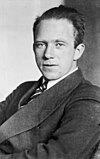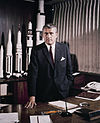Welcome! Check out today's deaths, recent deaths, or our deaths stats.
Feeling experimental? Head on over to our newest (and darkest) feature: Next-2-Die™ predictions
 Werner Heisenberg
Werner Heisenberg


German theoretical physicist and nobel prize winner (1901–1976).
Born December 5th, 1901 in Würzburg. [ref]
Died February 1st, 1976 at 74 years old in Munich (gallbladder cancer, renal cell carcinoma). [ref]
Werner Heisenberg (5 December 1901 - 1 February 1976) was a German theoretical physicist who made foundational contributions to quantum mechanics. He received the Nobel Prize for Physics in 1932, and is best known for the uncertainty principle, which states that the position and momentum of a particle cannot be simultaneously determined with accuracy. During World War II he led the German nuclear energy project. After the war he continued his research on quantum mechanics, authoring important work in the fields of particle physics, astrophysics, and mathematical physics. He also held the position of the Director of the Institute for Physics at the University of Munich from 1946 until his death in 1976. Heisenberg's legacy is as being one of the most significant physicists of the twentieth century. He was a noted teacher and lecturer, and his influence on younger physicists was immense. He will be remembered for his original contribution to the field of quantum mechanics and his unwavering dedication to physics.
You might also be interested in...




I’m the one that’s got to die when it’s time for me to die, so let me live my life the way I want to. Jimi Hendrix